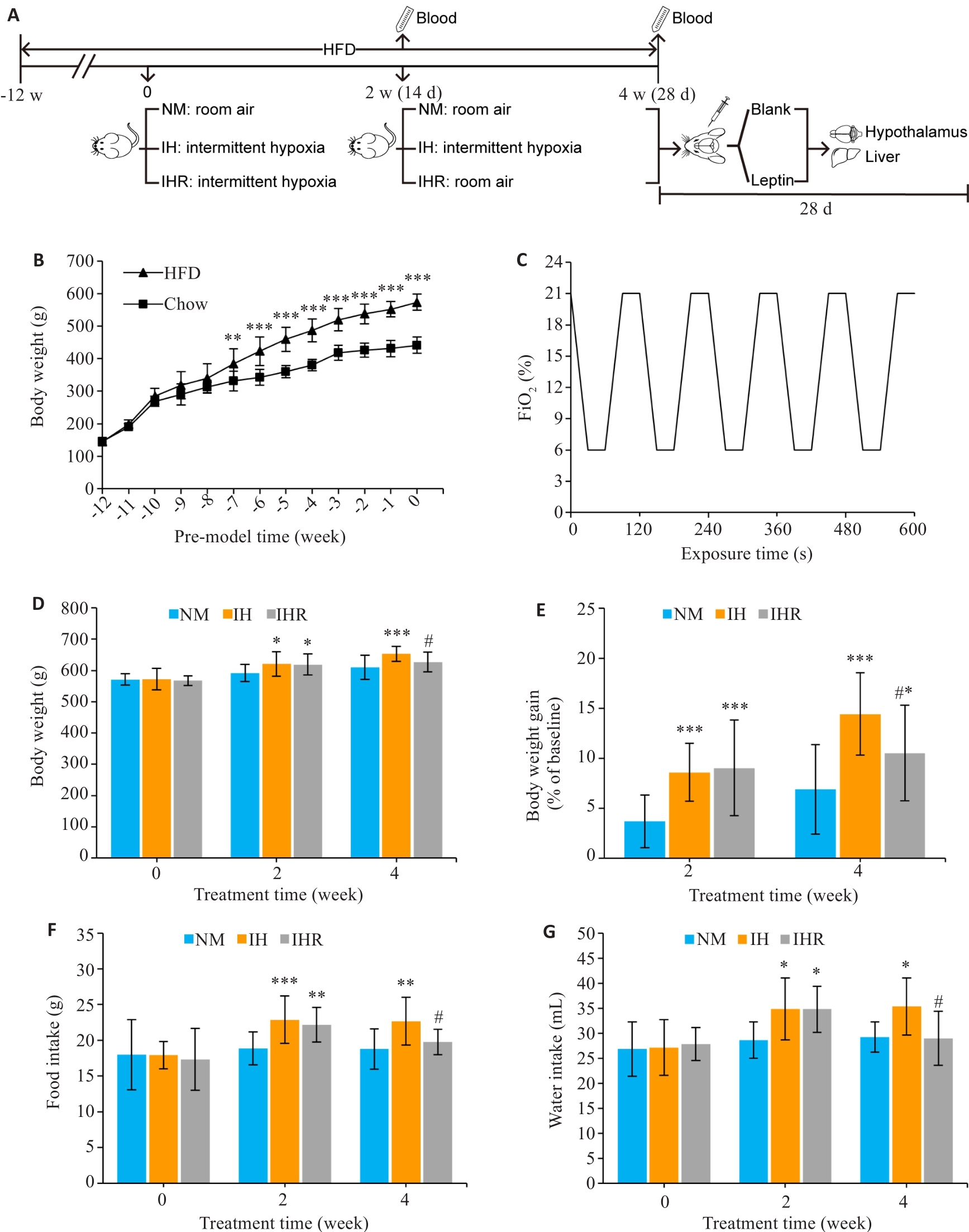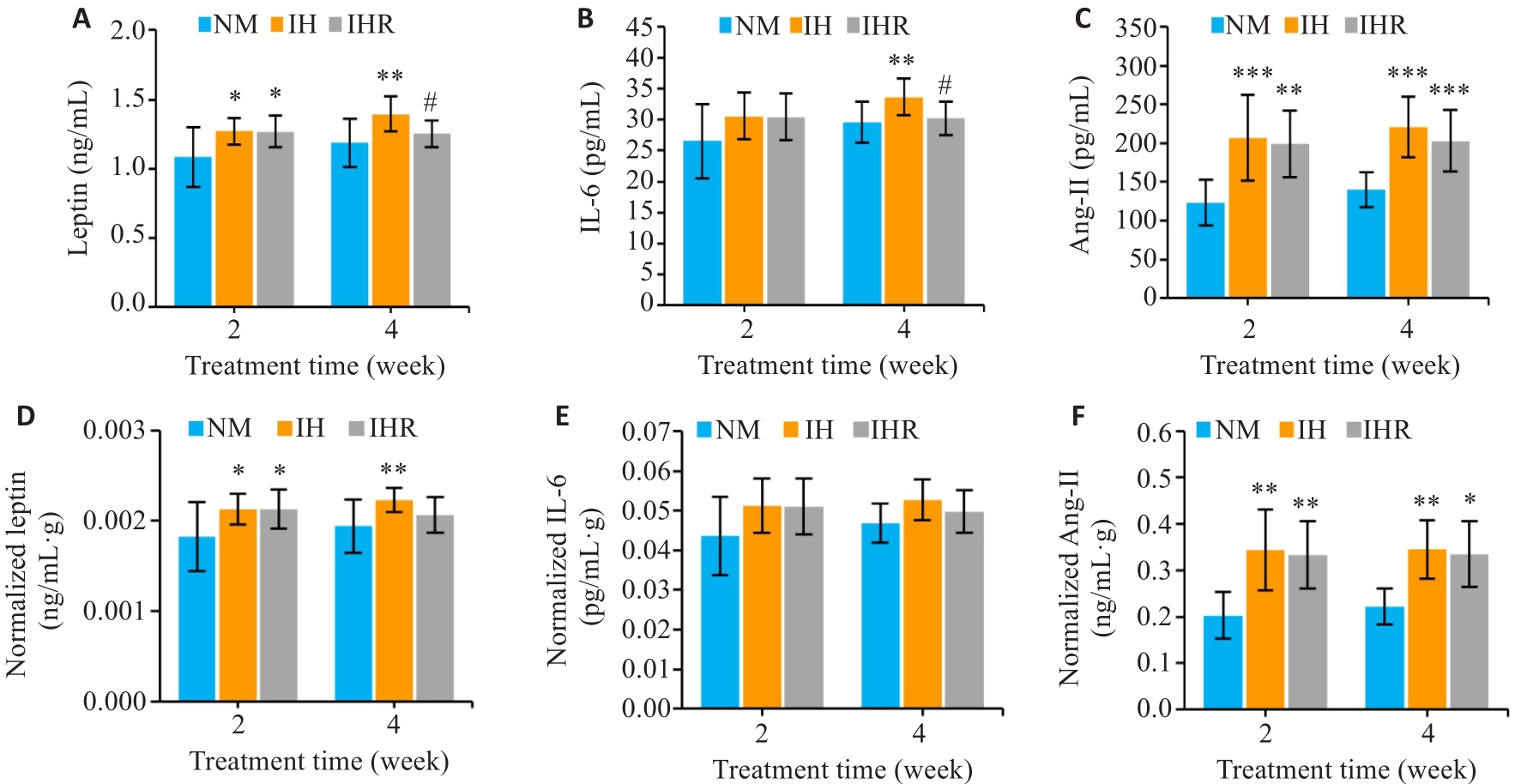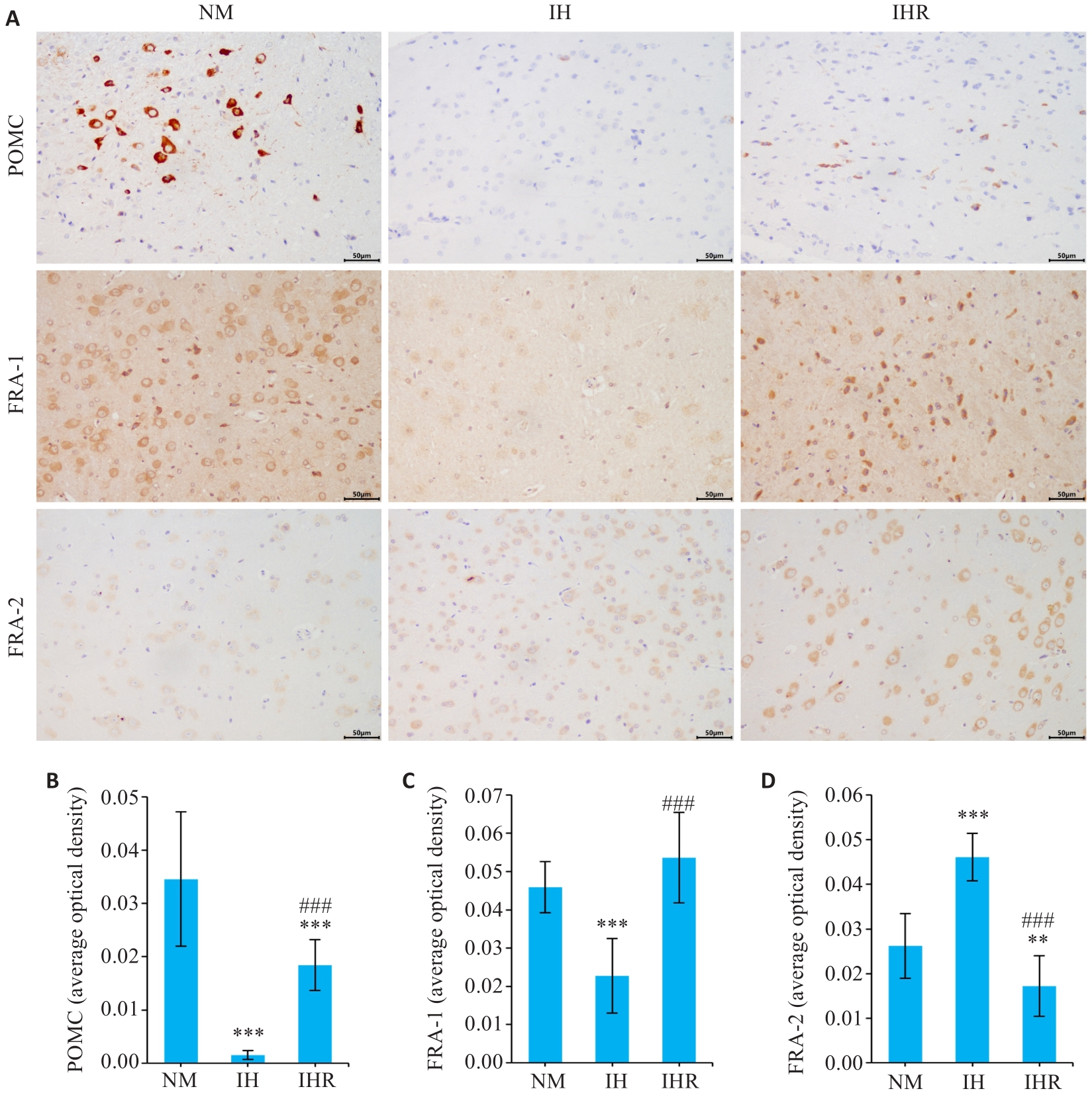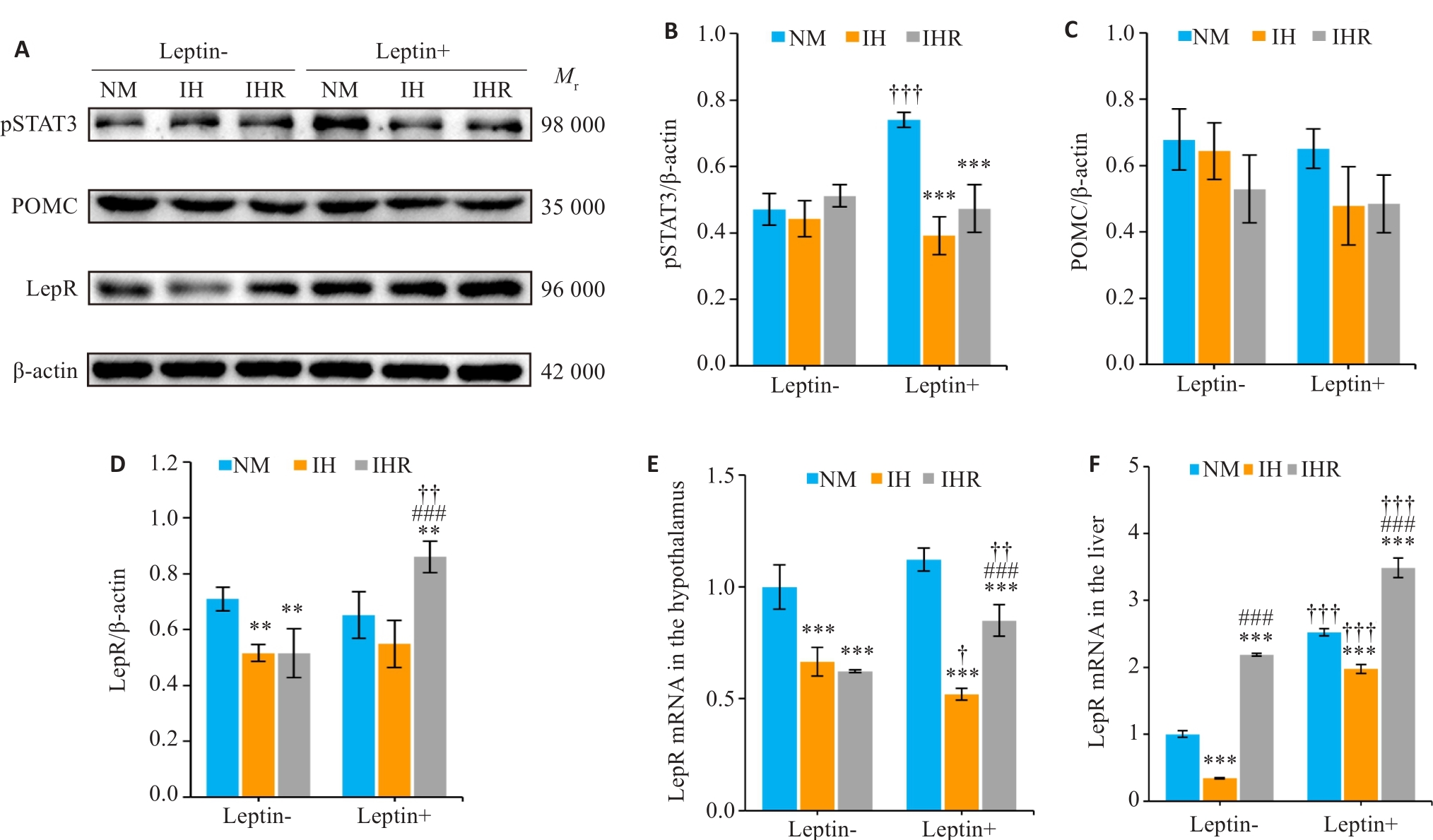Journal of Southern Medical University ›› 2024, Vol. 44 ›› Issue (9): 1696-1703.doi: 10.12122/j.issn.1673-4254.2024.09.09
Previous Articles Next Articles
Menglu DONG1( ), Tian ZHU1, Junwen MA2, Xiaohong DU3, Yuan FENG1,4,5(
), Tian ZHU1, Junwen MA2, Xiaohong DU3, Yuan FENG1,4,5( )
)
Received:2024-04-08
Online:2024-09-20
Published:2024-09-30
Contact:
Yuan FENG
E-mail:dongmlu@163.com;yuanstar@smu.edu.cn
Supported by:Menglu DONG, Tian ZHU, Junwen MA, Xiaohong DU, Yuan FENG. Reoxygenation improves reduced hypothalamic leptin responsiveness induced by intermittent hypoxia in obese rats[J]. Journal of Southern Medical University, 2024, 44(9): 1696-1703.
Add to citation manager EndNote|Ris|BibTeX
URL: https://www.j-smu.com/EN/10.12122/j.issn.1673-4254.2024.09.09
| Primer | Sequence (5'-3') | Product size (bp) |
|---|---|---|
| β-actin F | GCCATGTACGTAGCCATCCA | 375 |
| β-actin R | GAACCGCTCATTGCCGATAG | |
| LepR F | TGGCCCATGAGTAAAGTGAATGCT | 274 |
| LepR R | TCTTTGGTTTTCCAACTCCTTCCA |
Tab.1 Primer sequences for RT-qPCR
| Primer | Sequence (5'-3') | Product size (bp) |
|---|---|---|
| β-actin F | GCCATGTACGTAGCCATCCA | 375 |
| β-actin R | GAACCGCTCATTGCCGATAG | |
| LepR F | TGGCCCATGAGTAAAGTGAATGCT | 274 |
| LepR R | TCTTTGGTTTTCCAACTCCTTCCA |

Fig.1 Intermittent hypoxia (IH) increases weight gain and diet and water intake of DIO rats, which can be reduced by reoxygenation treatment. A: Protocol for intermittent hypoxia-reoxygenation (IHR) treatment in DIO rat models. Four-week-old male SD rats were fed HFD for 12 weeks and then separately treated with normoxia (NM), IH, and IHR for 4 weeks (n=15 per group). Following hypoxia treatment, 9 rats in each group were randomly selected to sacrifice, while the remaining rats were given intracerebroventricular injection of 4 μg leptin and sacrificed 1 h later. B: Body weight changes in HFD group (n=30) and normal chow group (n=10). C: IH cycle setting. D-G: Changes in body weight, weight gain and daily food and water intake in DIO rats with different treatments. Data are presented as Mean±SD. *P<0.05, **P<0.01, ***P<0.001 vs NM group; #P<0.05 vs IH group.

Fig.2 IH results in obvious elevation of leptin, IL-6, and Ang-II levels in DIO rats, which are lowered by reoxygenation. A-C: Changes in circulating leptin, IL-6, and Ang-II in each group after hypoxia treatment. D-F: Serum leptin, IL-6, and Ang-II levels normalized by body weight. Data are presented as Mean±SD (n=9). *P<0.05, **P<0.01, ***P<0.001 vs NM group; #P<0.05 vs IH group.

Fig.3 IH inhibits the production of the hypothalamic appetite-suppressing peptide POMC and the activity of leptin-responsive neurons in DIO rats, while reoxygenation promotes remission of these changes. A: Immunohistochemical analysis of expressions of POMC and FRA-1/2 in the hypothalamus (scale bar=50 μm). B-D: Semi-quantitative evaluation of POMC, FRA-1, and FRA-2 expressions (Mean±SD, n=9). **P<0.01, ***P<0.001 vs NM group; ###P<0.001 vs IH group.

Fig.4 IH impairs hypothalamic leptin responsiveness in the DIO rats, and reoxygenation treatment fails to achieve full restoration. A: Western blotting of pSTAT3, POMC, and LepR in the hypothalamus 1 h after leptin ICV injection. B-D: Relative expressions of pSTAT3, POMC, and LepR normalized by β-actin. E, F: Relative mRNA expression of hypothalamic and hepatic LepR. Data are presented as Mean±SD (n=6). **P<0.01, ***P<0.001 vs NM group; ###P<0.01 vs IH group; †P<0.05, ††P<0.01, †††P<0.001 vs leptin ICV injection.
| 1 | PATEL S R. Obstructive Sleep Apnea [J]. Ann Intern Med, 2019, 171(11): ITC81-96. |
| 2 | Lv RJ, Liu XY, Zhang Y, et al. Pathophysiological mechanisms and therapeutic approaches in obstructive sleep apnea syndrome[J]. Signal Transduct Target Ther, 2023, 8(1): 218. |
| 3 | Gottlieb DJ, Punjabi NM. Diagnosis and management of obstructive sleep apnea: a review[J]. JAMA, 2020, 323(14): 1389-400. |
| 4 | Giampá SQC, Lorenzi-Filho G, Drager LF. Obstructive sleep apnea and metabolic syndrome[J]. Obesity, 2023, 31(4): 900-11. |
| 5 | Peppard PE, Young T, Barnet JH, et al. Increased prevalence of sleep-disordered breathing in adults[J]. Am J Epidemiol, 2013, 177(9): 1006-14. |
| 6 | Drager LF, Brunoni AR, Jenner R, et al. Effects of CPAP on body weight in patients with obstructive sleep apnoea: a meta-analysis of randomised trials[J]. Thorax, 2015, 70(3): 258-64. |
| 7 | Feng Y, Maislin D, Keenan BT, et al. Physical activity following positive airway pressure treatment in adults with and without obesity and with moderate-severe obstructive sleep apnea[J]. J Clin Sleep Med, 2018, 14(10): 1705-15. |
| 8 | Quan SF, Budhiraja R, Clarke DP, et al. Impact of treatment with continuous positive airway pressure (CPAP) on weight in obstructive sleep apnea[J]. J Clin Sleep Med, 2013, 9(10): 989-93. |
| 9 | Zhang YY, Chua S Jr. Leptin function and regulation[J]. Compr Physiol, 2017, 8(1): 351-69. |
| 10 | Zhu CJ, Jiang ZY, Xu YZ, et al. Profound and redundant functions of arcuate neurons in obesity development[J]. Nat Metab, 2020, 2(8): 763-74. |
| 11 | Ulukavak Ciftci T, Kokturk O, Bukan N, et al. Leptin and ghrelin levels in patients with obstructive sleep apnea syndrome[J]. Respiration, 2005, 72(4): 395-401. |
| 12 | Imayama I, Prasad B. Role of leptin in obstructive sleep apnea[J]. Ann Am Thorac Soc, 2017, 14(11): 1607-21. |
| 13 | Harsch IA, Konturek PC, Koebnick C, et al. Leptin and ghrelin levels in patients with obstructive sleep apnoea: effect of CPAP treatment[J]. Eur Respir J, 2003, 22(2): 251-7. |
| 14 | Chen X, Niu X, Xiao Y, et al. Effect of continuous positive airway pressure on leptin levels in patients with obstructive sleep apnea: a meta-analysis[J]. Otolaryngol Head Neck Surg, 2015, 152(4): 610-8. |
| 15 | de Santis S, Cambi J, Tatti P, et al. Changes in ghrelin, leptin and pro-inflammatory cytokines after therapy in Obstructive Sleep Apnea Syndrome (OSAS) patients[J]. Pol Otolaryngol, 2015, 69(2): 1-8. |
| 16 | Tachikawa R, Ikeda K, Minami T, et al. Changes in energy metabolism after continuous positive airway pressure for obstructive sleep apnea[J]. Am J Respir Crit Care Med, 2016, 194(6): 729-38. |
| 17 | Ciriello J, Moreau JM, McCoy A, et al. Effect of intermittent hypoxia on arcuate nucleus in the leptin-deficient rat[J]. Neurosci Lett, 2016, 626: 112-8. |
| 18 | Benjafield AV, Ayas NT, Eastwood PR, et al. Estimation of the global prevalence and burden of obstructive sleep apnoea: a literature-based analysis[J]. Lancet Respir Med, 2019, 7(8): 687-98. |
| 19 | Moreau JM, Ciriello J. Effects of acute intermittent hypoxia on energy balance and hypothalamic feeding pathways[J]. Neuroscience, 2013, 253: 350-60. |
| 20 | Gozal D, Gileles-Hillel A, Cortese R, et al. Visceral white adipose tissue after chronic intermittent and sustained hypoxia in mice[J]. Am J Respir Cell Mol Biol, 2017, 56(4): 477-87. |
| 21 | Wang HP, Wang Y, Xia TL, et al. Pathogenesis of abnormal hepatic lipid metabolism induced by chronic intermittent hypoxia in rats and the therapeutic effect of N-acetylcysteine[J]. Med Sci Monit, 2018, 24: 4583-91. |
| 22 | Almendros I, Wang Y, Gozal D. The polymorphic and contradictory aspects of intermittent hypoxia[J]. Am J Physiol Lung Cell Mol Physiol, 2014, 307(2): L129-40. |
| 23 | Navarrete-Opazo A, Mitchell GS. Therapeutic potential of intermittent hypoxia: a matter of dose[J]. Am J Physiol Regul Integr Comp Physiol, 2014, 307(10): R1181-97. |
| 24 | Yue XP, Zhou YZ, Qiao M, et al. Intermittent hypoxia treatment alleviates memory impairment in the 6-month-old APPswe/PS1dE9 mice and reduces amyloid beta accumulation and inflammation in the brain[J]. Alzheimers Res Ther, 2021, 13(1): 194. |
| 25 | Rogers RS, Wang H, Durham TJ, et al. Hypoxia extends lifespan and neurological function in a mouse model of aging[J]. PLoS Biol, 2023, 21(5): e3002117. |
| 26 | Panza GS, Puri S, Lin HS, et al. Daily exposure to mild intermittent hypoxia reduces blood pressure in male patients with obstructive sleep apnea and hypertension[J]. Am J Respir Crit Care Med, 2022, 205(8): 949-58. |
| 27 | Saeed O, Bhatia V, Formica P, et al. Improved exercise performance and skeletal muscle strength after simulated altitude exposure: a novel approach for patients with chronic heart failure[J]. J Card Fail, 2012, 18(5): 387-91. |
| 28 | Drager LF, Li JG, Reinke C, et al. Intermittent hypoxia exacerbates metabolic effects of diet-induced obesity[J]. Obesity, 2011, 19(11): 2167-74. |
| 29 | Valverde-Pérez E, Olea E, Obeso A, et al. Intermittent hypoxia and diet-induced obesity on the intestinal wall morphology in a murine model of sleep apnea[J]. Adv Exp Med Biol, 2023, 1427: 89-97. |
| 30 | Phillips BG, Kato M, Narkiewicz K, et al. Increases in leptin levels, sympathetic drive, and weight gain in obstructive sleep apnea[J]. Am J Physiol Heart Circ Physiol, 2000, 279(1): H234-7. |
| 31 | Zhao SG, Zhu Y, Schultz RD, et al. Partial leptin reduction as an insulin sensitization and weight loss strategy[J]. Cell Metab, 2019, 30(4): 706-19.e6. |
| 32 | Zhao SG, Kusminski CM, Elmquist JK, et al. Leptin: less is more[J]. Diabetes, 2020, 69(5): 823-9. |
| 33 | Pretz D, Le Foll C, Rizwan MZ, et al. Hyperleptinemia as a contributing factor for the impairment of glucose intolerance in obesity[J]. FASEB J, 2021, 35(2): e21216. |
| 34 | Friedman JM. Leptin and the endocrine control of energy balance[J]. Nat Metab, 2019, 1(8): 754-64. |
| 35 | Pérez-Cadahía B, Drobic B, Davie JR. Activation and function of immediate-early genes in the nervous system[J]. Biochem Cell Biol, 2011, 89(1): 61-73. |
| 36 | de Git KCG, Adan RAH. Leptin resistance in diet-induced obesity: the role of hypothalamic inflammation[J]. Obes Rev, 2015, 16(3): 207-24. |
| 37 | Balland E, Cowley MA. New insights in leptin resistance mechanisms in mice[J]. Front Neuroendocrinol, 2015, 39: 59-65. |
| 38 | Gileles-Hillel A, Almendros I, Khalyfa A, et al. Prolonged exposures to intermittent hypoxia promote visceral white adipose tissue inflammation in a murine model of severe sleep apnea: effect of normoxic recovery[J]. Sleep, 2017, 40(3): 1093. |
| 39 | Bailly S, Daabek N, Jullian-Desayes I, et al. Partial failure of CPAP treatment for sleep apnoea: analysis of the French national sleep database[J]. Respirology, 2020, 25(1): 104-11. |
| 40 | Siopi D, Steiropoulos P. The influence of CPAP therapy on basal metabolic rate and physical activity in obese patients with obstructive sleep apnea[J]. Nutrients, 2023, 15(20): 4446. |
| 41 | Batool-Anwar S, Goodwin JL, Drescher AA, et al. Impact of CPAP on activity patterns and diet in patients with obstructive sleep apnea (OSA)[J]. J Clin Sleep Med, 2014, 10(5): 465-72. |
| 42 | Perrini S, Cignarelli A, Quaranta VN, et al. Correction of intermittent hypoxia reduces inflammation in obese subjects with obstructive sleep apnea[J]. JCI Insight, 2017, 2(17): e94379. |
| [1] | Xueli ZHOU, Hua LI, Qingyu CHEN, Meina JIN, Haibo LI, Wei BAI, Chuxuan JIA, Cuiying WEI. Effects of chronic intermittent hypoxia and reoxygenation on insulin resistance and skeletal muscle miR-27a-3p/PPARγ/IRS1/PI3K/AKT expressions in rats [J]. Journal of Southern Medical University, 2024, 44(9): 1729-1737. |
| [2] | Jie CHEN, Chenxu LIU, Chun WANG, Li LI, Weiting TAO, Jingru XUN, Honghui TANG, Li HUANG. Exogenous leptin improves cerebral ischemia-reperfusion-induced glutamate excitotoxic injury in mice by up-regulating GLT-1 and GLAST expression in astrocytes [J]. Journal of Southern Medical University, 2024, 44(6): 1079-1087. |
| [3] | Guoxin LIANG, Hongyue TANG, Chang GUO, Mingming ZHANG. MiR-224-5p overexpression inhibits oxidative stress by regulating the PI3K/Akt/FoxO1 axis to attenuate hypoxia/reoxygenation-induced cardiomyocyte injury [J]. Journal of Southern Medical University, 2024, 44(6): 1173-1181. |
| [4] | BAO Hansheng, WANG Sutong, LÜ Mujie, WANG Yongcheng, JIANG Ping, LI Xiao. Activation of α7 nAChR improves white fat homeostasis and promotes beige adipogenesis and thermogenesis in obese mice [J]. Journal of Southern Medical University, 2024, 44(3): 499-506. |
| [5] | ZHU Jiwei, LU Manlu, JIAO Qianqian, SUN Yunliang, LIU Lu, DING Honghong, YU Yan, PAN Lei. Analysis of gut target microbiota and species difference in patients with obstructive sleep apnea based on 16S rRNA sequencing [J]. Journal of Southern Medical University, 2024, 44(1): 146-155. |
| [6] | WEI Xixi, LI Chaohong, ZHAO Chenlu, ZHAO Baosheng, LIU Yuzhen. Characterization of metabotropic glutamate receptor 7 and 8 in rat superior cervical ganglion and their changes following chronic intermittent hypoxia [J]. Journal of Southern Medical University, 2023, 43(7): 1172-1178. |
| [7] | ZHOU Bei, LI Jing, FANG Chenyuan, HUANG Yanan, SANG Guirui, TAO Shaoping, HE Chunling. Comparison of therapeutic effect of metformin hydrochloride/vildagliptin and liraglutide on type 2 diabetes mellitus in obese patients [J]. Journal of Southern Medical University, 2023, 43(3): 436-442. |
| [8] | ZHAO Huanling, LING Yuxiao, MI Shuai, ZHU Jiahao, FAN Jiayao, YANG Ye, WANG Jing, LI Yingjun. Associations of circulating leptin levels with colorectal adenoma and colorectal cancer: a case-control and Mendelian randomization study [J]. Journal of Southern Medical University, 2023, 43(12): 1989-1997. |
| [9] | WEI Min, CHEN Naijie, LI Jingyi, LIU Dan, SHEN Shuanghong, WANG Feng, WU Runhua, CHEN Qin. Quantitative analysis of differential proteins in renal tissues of rats with chronic intermittent hypoxic exposure based on TMT and PRM technology [J]. Journal of Southern Medical University, 2023, 43(11): 1857-1864. |
| [10] | YE Xiao, SONG Yingxiang, ZHAO Yu, ZHU Dalong. Cold stimulation promotes interleukin-4 secretion by mucosal-associated invariant T cells in the adipose tissue to promote adipose browning in mice [J]. Journal of Southern Medical University, 2023, 43(11): 1881-1885. |
| [11] | YU Genming, WANG Xinwei, LUO Jinguang, SU Xiao, TAO Huaixiang, WEN Zhiyuan, GUAN Han. Role of SPP1 in acute kidney injury induced by renal ischemia-reperfusion in rats [J]. Journal of Southern Medical University, 2023, 43(11): 1947-1954. |
| [12] | WU Jianghao, WU Yongxin, YANG Yunfei, YU Jing, FU Rao, SUN Yue, XIAO Qian. Mibefradil improves skeletal muscle mass, function and structure in obese mice [J]. Journal of Southern Medical University, 2022, 42(7): 1032-1037. |
| [13] | SU Xiaofeng, HAN Jiming, GAO Yinghui, FAN Li, HE Zijun, ZHAO Zhe, LIN Junlin, GUO Jingjing, CHEN Kaibing, GAOYan, LIU lin. A long-term ischemic stroke risk score model in patients aged 60 years and older with obstructive sleep apnea: a multicenter prospective cohort study [J]. Journal of Southern Medical University, 2022, 42(3): 338-346. |
| [14] | XING Yao, LIU Ziyao, ZHANG Xiaohui, WANG Jianming. Effects of leptin on proliferation and differentiation of hypoxic rat retinal progenitor cells in vitro [J]. Journal of Southern Medical University, 2022, 42(3): 354-359. |
| [15] | . Research progress in the role and mechanism of polysaccharides in regulating glucose and lipid metabolism [J]. Journal of Southern Medical University, 2021, 41(3): 471-474. |
| Viewed | ||||||
|
Full text |
|
|||||
|
Abstract |
|
|||||